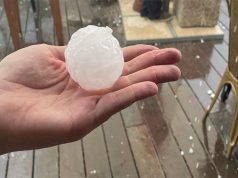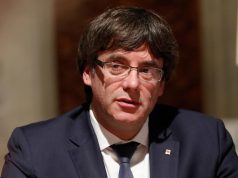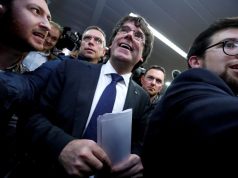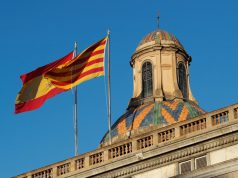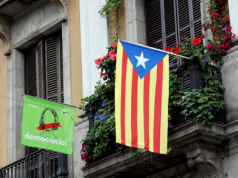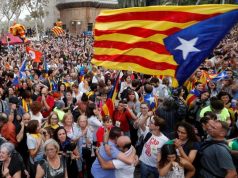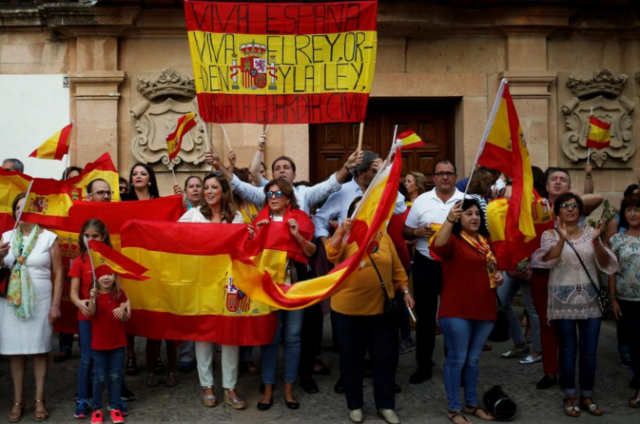
MADRID/BARCELONA – Spanish Prime Minister Mariano Rajoy said on Saturday he would not rule out using the constitutional powers to remove Catalonia’s autonomous status if it claimed independence as tens of thousands took to the streets to call for talks.
The wealthy northeastern region of Catalonia, with its own language and culture, held a referendum on Oct. 1 on independence, in defiance of the Spanish constitutional court which had ruled the vote illegal.
Until now, Rajoy has remained vague on whether he would use article 155, the so-called nuclear option, of the constitution which enables him to sack the regional government and call a fresh local election.
In an interview with Spanish newspaper El Pais on Saturday Rajoy was asked if he was ready to trigger the article 155 of the constitution, and said: “I don’t rule out absolutely anything that is within the law … Ideally, it shouldn’t be necessary to implement extreme solutions but for that not to happen things would have to be changed.”
Tens of thousands of people gathered across Spain earlier on Saturday as Catalonia prepared to declare independence from the rest of the country, many dressed in white and calling for talks to defuse Spain’s worst political crisis for decades.
The Catalan authorities say around 90 percent of those who voted supported a split from Spain. Madrid says secession is illegal under the Spain’s 1978 constitution. Residents of Catalonia who oppose secession largely boycotted the vote.
The crisis is a political test for Rajoy, who has been uncompromising. Some 900 people were injured during the vote when police tried to disrupt voting, firing rubber bullets and charging crowds with truncheons.
The political stand-off has divided the country, pushed banks and companies to move their headquarters outside Catalonia and shaken market confidence in the Spanish economy, prompting calls from the European Commission for Catalan and Spanish leaders to find a political solution.
“I hope that the Catalonia that makes pacts, is moderate and for many years contributed to Spain’s economic growth and improvement in welfare and wealth returns. It can’t be in the hands of extremists, the radicals and the (far-left secessionist party) CUP,” he said.
However, Rajoy ruled out using mediators to resolve the crisis and also said the issue would not force a snap national election.
PEACEFUL PROTESTS
In peaceful protests called across 50 Spanish cities on Saturday morning, thousands gathered dressed in white and carrying banners calling for peace and dialogue between leaders.
In Barcelona, protesters chanted “let’s talk” in Catalan, while many carried signs criticizing political leaders for not finding a diplomatic solution to the impasse.
“This is producing a social rupture in Catalonia and this has to be resolved through dialogue, never via unilateralism,” Jose Manuel Garcia, 61, an economist who attended the protest dressed in white said.
“I‘m very worried. This will end badly and everyone will lose (without dialogue).”
While Catalan leader Carles Puigdemont has said he is open to mediation, Rajoy has demanded he give up the independence campaign before discussions can be held.
In Madrid thousands gathered beneath the enormous Spanish flag in Colon Plaza waving their own flags, singing and chanting “Viva España” and “Viva Catalonia”.
“I’ve come because I feel very Spanish and makes me very sad what’s happened,” said Rosa Borras, 47, an unemployed secretary who had joined a noisy gathering in central Madrid.
Borras, wearing a “Catalonia, we love you” sticker and surrounded by thousands waving Spanish flags, added: “I wanted to be here for unity, because I also feel very Catalan. My family lives in Catalonia.”
EU CONCERN
Rajoy’s government mobilized thousands of national police to stop Sunday’s vote, leading to clashes with would-be voters as they tried to close polling stations in schools and remove ballot boxes.
In the El Pais interview, Rajoy said the around 4,000 extra police shipped in to the region would stay until the conflict had been resolved.
The police violence drew widespread condemnation and forced the government to issue an apology on Friday, although tensions continued to rise after reports of plans for the Catalan parliament to vote on a unilateral declaration of independence on Tuesday.
The crisis has also caused disquiet among Spain’s European Union partners, and German Chancellor Angela Merkel has discussed it with European Commission President Jean-Claude Juncker, an EU official told Reuters.
Concern is growing in EU capitals about the impact of the crisis on the Spanish economy, the fourth largest in the euro zone, and on possible spillovers to other economies.
European finance ministers, gathering in Brussels on Monday and Tuesday for a regular meeting, could discuss the issue, although it is not formally on the agenda, EU officials said.
The support given in public statements by EU leaders to Rajoy is combined with concern expressed in private about how the Spanish government’s use of police to prevent Catalans from voting last week in the independence referendum could backfire.
Some EU states are worried that talk of Catalan independence could fuel secessionist feelings in other parts of Europe.




